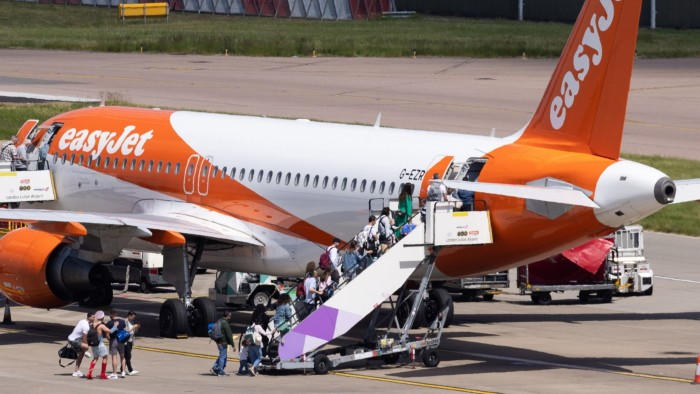Unlock the Editor’s Digest for free
Roula Khalaf, Editor of the FT, selects her favourite stories in this weekly newsletter.
EasyJet said it had halved its losses at the start of the winter season, as the low-cost airline was boosted by lower fuel costs and more people travelling over the Christmas period.
The FTSE 100 group on Wednesday reported a pre-tax loss of £61mn for the three months to December, down from £126mn in the same period a year earlier.
EasyJet forecast that losses for the whole winter would fall, adding that there had been “strong” demand for travel over Easter.
But the airline said it had been forced to discount prices in the current quarter, in part because it had launched new routes that had taken time to bed in.
“We are needing to put out some great fares to make sure we fill the aircraft during this period,” said new chief executive Kenton Jarvis.
Jarvis said he expected the discounting to be confined to the current quarter, but shares in the airline fell 5 per cent in early trading on Wednesday before mounting a partial recovery to trade 3.4 per cent lower by early afternoon.
Alex Paterson, an analyst at Peel Hunt, said the relative weakness was expected, and exacerbated by the timing of Easter this year, which falls in the next quarter.
EasyJet is the first big European airline to update on trading this year. The industry has so far appeared largely immune to the wider economic gloom in the UK, and executives believe consumers are prioritising spending on travel and holidays. But investors have been closely watching for any signs of cracks in demand, or of airlines charging lower fares for the months ahead.
“We continue to see that holidays remain a priority for households,” said Jarvis, pointing to survey data suggesting consumers viewed travel spending as “essential” rather than discretionary.
He added that easyJet would consider opening a base at London’s Heathrow airport, if it ever built a third runway. His comments came after ministers signalled their willingness to back an airport expansion in a drive to boost economic growth.
Despite the winter losses, easyJet said it was on course to report pre-tax profits of £709mn for its current financial year, which runs to September, in line with market consensus compiled by the company.
The quieter winter season is often lossmaking for airlines, which have high fixed costs and typically charge lower fares to fill their aircraft during the off-season.
Jarvis said the airline had made “positive progress” towards its medium-term target of annual pre-tax profits of £1bn.
Passenger numbers in the three months to the end of December increased to 21.2mn from 19.8mn a year earlier, as easyJet took delivery of six new Airbus short-haul aircraft.
Revenue per seat — a proxy for ticket prices that includes extras such as baggage — rose 6 per cent to £74.36. Fuel costs fell 3 per cent in the quarter to £500mn.
Read the full article here

